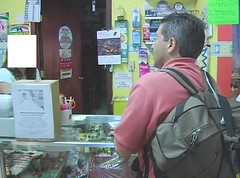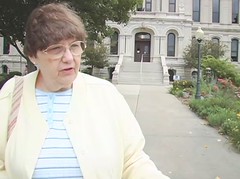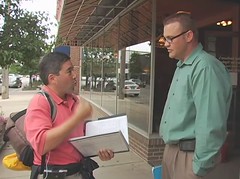The most telling story came to us in a Mexican store down the street. I spoke with one of the counter people, who wished not to be identified. She told us that she did have insurance (through her husband) and that she was happy with the system and that she would not change anything. Then, next to the register, I noticed a posted sign with a picture of a young boy in a hospital bed pleading for $100,000 to help with a kidney transplant.
Doesn’t that tell it all?
Wednesday, July 1, 2009
Voice of the People: Jorge (Warsaw, IN)
Voice of the People: Uprendra in Warsaw, IN
Being self-employed, and that business was not so good this year, Uprendra cannot afford health coverage. He is not insured, nor is any of the staff. And, he has diabetes and gets his insulin, when he can, as free drug samples from his brother, who is a retired doctor. I was humbled by his generosity, the complimentary room, and even more, the $20 donation, his wife (and hotel co-operator) Sheila, gave me when I checked out the following morning.
Voice of the People: Harold near Warsaw, IN
Gruff but friendly, and with a face that oozed sincerity, Harold answered, “The insurance—80/20, but my wife is totally disabled so she’s on the Medicaid … and I got a $5,000 deductible! Every year, it just tears me up. We get good care over there at Lutheran in Ft. Wayne but it’s outrageous. When the doctor gives a regular prescription—not the generic stuff, and the pharmacist automatically gives you the generic, makes you sick and then you have to go back to the doctor to get the right stuff to send to the pharmacist, that don’t make no sense.” I asked Harold if he had any choice of coverage or if this was the only insurance offered.
“There’s no choice,” he told me.
Indeed …
Voice of the People: Krystal in Warsaw, IN
Meeting Krystal in front of the Courthouse on Center Street, I explained my walk, its purpose. Krystal asked how many pairs of shoes I have and so I showed her the extra pair strapped in a bag to my backpack and told her of the several more in the luggage at the hotel. And we that, we began talking about healthcare. “Insurance rates are sky high,” she told me, lamented further that, “like I was talking with my doctor, you almost have to call the insurance companies to get the approval for what drugs you can prescribe—insurance companies are driving the show … they give the discounts or I think they’re in the cahoots with some of the drug companies. They say ‘Oh, we’re having a special on Lipitor' and so they push Lipitor.” We talked about the pharmaceutical companies and that drug costs just seemed to be too high.
Brian in Etna Green, Indiana

Brian in Etna Green, Indiana
Originally uploaded by walk4healthcare
“I believe government should not be in healthcare,” Brian told me, though he added that he’d like to see some regulatory changes to actually increase competition, ensure personal responsibility and decrease prices. “The system is sure not working,” he told me.
At the Mexican store in Warsaw, Indiana

At the Mexican store in Warsaw, Indiana
Originally uploaded by walk4healthcare
The most telling story came to us in a Mexican store down the street. I spoke with one of the counter people, who wished not to be identified. She told us that she did have insurance (through her husband) and that she was happy with the system and that she would not change anything. Then, next to the register, I noticed a posted sign with a picture of a young boy in a hospital bed pleading for $100,000 to help with a kidney transplant.
Doesn’t that tell it all?
Brittany & Amanda at the Long John Silver's restaurant in Warsaw, Indiana

Brittany & Amanda at the Long John Silver's restaurant in Warsaw, Indiana
Originally uploaded by walk4healthcare
Brittany, on the left, told me she has no insurance. She said, “I think everybody should have insurance. You never know what will happen. I've been sick and had to pay cash and it's not cheery.” Amanda also has no insurance and now has “tons of medical bills.” She told me she is slowly— “very slowly,” she put it—paying for them.
Ed Nordstrom at the Long John Silver's restaurant in Warsaw, Indiana

Ed Nordstrom at the Long John Silver's restaurant in Warsaw, Indiana
Originally uploaded by walk4healthcare
Ed was in the service, in the Philippines during World War II. He was later an electrician at the Harvard Cyclotron in Cambridge (on Oxford Street). He has had many medical problems but hasn't had any difficulties being on Medicare. Some things are not paid for but by-and-large, he's happy. He has often thought that universal healthcare insurance should be provided by the government and that higher taxes were likely necessary. “If the government managed its budget better, there'd be money to pay for it,” he added. He also said that “People without healthcare insurance live under handicapped conditions. With insurance, a wage-earner can be free to concentrate on his family, his education, and think more clearly.” He was very happy I met with him and concluded, “I'm so surprised at the opportunity to talk.”
Uprendra at the Warsaw Days Inn

Uprendra at the Warsaw Days Inn
Originally uploaded by walk4healthcare
Being self-employed, and that business was not so good this year, Uprendra cannot afford health coverage. He is not insured, nor is any of the staff. And, he has diabetes and gets his insulin, when he can, as free drug samples from his brother, who is a retired doctor. I was humbled by his generosity, the complimentary room, and even more, the $20 donation, his wife (and hotel co-operator) Sheila, gave me when I checked out the following morning.
Krystal outside the Warsaw courthouse building

Krystal outside the Warsaw courthouse building
Originally uploaded by walk4healthcare
Meeting Krystal in front of the Courthouse on Center Street, I explained my walk, its purpose. Krystal asked how many pairs of shoes I have and so I showed her the extra pair strapped in a bag to my backpack and told her of the several more in the luggage at the hotel. And we that, we began talking about healthcare. “Insurance rates are sky high,” she told me, lamented further that, “like I was talking with my doctor, you almost have to call the insurance companies to get the approval for what drugs you can prescribe—insurance companies are driving the show … they give the discounts or I think they’re in the cahoots with some of the drug companies. They say ‘Oh, we’re having a special on Lipitor' and so they push Lipitor.” We talked about the pharmaceutical companies and that drug costs just seemed to be too high.
Harold outside of Warsaw, Indiana

Harold outside of Warsaw, Indiana
Originally uploaded by walk4healthcare
Gruff but friendly, and with a face that oozed sincerity, Harold answered, “The insurance—80/20, but my wife is totally disabled so she’s on the Medicaid … and I got a $5,000 deductible! Every year, it just tears me up. We get good care over there at Lutheran in Ft. Wayne but it’s outrageous. When the doctor gives a regular prescription—not the generic stuff, and the pharmacist automatically gives you the generic, makes you sick and then you have to go back to the doctor to get the right stuff to send to the pharmacist, that don’t make no sense.” I asked Harold if he had any choice of coverage or if this was the only insurance offered.
“There’s no choice,” he told me.
Indeed ...
Scott in Warsaw, Indiana

Scott in Warsaw, Indiana
Originally uploaded by walk4healthcare
Scott told me that, “There should be less government involvement. I really think it should be left in the hands of the people.” He added that he used to work in the orthopedic device industry (there are many in Warsaw). “What I feel that would do, if healthcare was nationalized, is that it would undervalue the products they are making. In the end, I think it would work out as what they would lose in sales, they would get in volume, but I really feel that the healthcare scenario needs to be left to people, not the government.”
Day 5 Dispatch (7/1) – Bourbon, IN to Warsaw, IN
Writing this dispatch three days after the first of July, it feels as if it were years ago (and certainly many miles and a state away as I am now, as of this writing, in western
The air was cool and refreshing but as the wind was still, the truck fumes (new US-30 is a major highway) lay stagnant and choking, I stopped four miles down at the 19 & 30 in Etna Green. From there I decided to head along Old US-30, running parallel south of New 30 and much more scenic and less carbon monoxide-laden . But before leaving (and after a breakfast pizza), I had a chance to speak with Brian—the owner of the 19 & 30 gas station & restaurant.
Brian: “I believe government should not be in healthcare,” he said, though he added that he’d like to see some regulatory changes to actually increase competition, ensure personal responsibility and decrease prices. “The system is sure not working,” he told me.
 And so I took off for Etna Green and, reaching Old US-30 headed east. Four miles later I was in Atwo
And so I took off for Etna Green and, reaching Old US-30 headed east. Four miles later I was in Atwo od—a small town where you could throw a stone (if you were good) from one end of the town to the other. There I met with Katie where we shot video of the walk, did, in fact, meet with several people along the way and in
od—a small town where you could throw a stone (if you were good) from one end of the town to the other. There I met with Katie where we shot video of the walk, did, in fact, meet with several people along the way and in
Harold: Gruff but friendly, and with a face that oozed sincerity, Harold answered, “The insurance—80/20, but my wife is totally disabled so she’s on the Medicaid … and I got a $5,000 deductible! Every year, it just tears me up. We get good care over there at Lutheran in
 Reaching Warsaw, I spent some time contemplating the War Memorial (officially the Kosciusko County War Memorial). As some may know, I was inspired to do this Walk for many reasons among which were the shockingly selfish arguments I began hearing from industry lobbyists and other groups over in Washington in efforts to derail healthcare reform. What ever happened to the notion of a greater good and self sacrifice—principles for which the hundreds of men and women listed on this memorial paid the highest price of devotion.
Reaching Warsaw, I spent some time contemplating the War Memorial (officially the Kosciusko County War Memorial). As some may know, I was inspired to do this Walk for many reasons among which were the shockingly selfish arguments I began hearing from industry lobbyists and other groups over in Washington in efforts to derail healthcare reform. What ever happened to the notion of a greater good and self sacrifice—principles for which the hundreds of men and women listed on this memorial paid the highest price of devotion.
And so, with somber thoughts in mind, we headed farther into town along Lake Street. There we met a smartly dressed man—Scott.
 Scott: He said that, “There should be less government involvement. I really think it should be left in the hands of the people.” He added that he used to work in the orthopedic device industry (there are many in
Scott: He said that, “There should be less government involvement. I really think it should be left in the hands of the people.” He added that he used to work in the orthopedic device industry (there are many in
The most telling story came to us in a Mexican restaurant down the street. I spoke with one of the counter people, who wished not to be identified. She told us that she did have insurance (through her husband) and that she was happy with the system and that she would not change anything. Then, next to the register, I noticed a posted sign with a picture of a young boy in a hospital bed pleading for $100,000 to help with a kidney transplant.
Here's the sign ...
Doesn't that tell it all?
So the videographer and headed back up Lake street where I met with Krystal in front of the
 Krystal: I explained my walk, its purpose. Krystal asked how many pairs of shoes I have and so I showed her the extra pair strapped in a bag to my backpack and told her of the several more in the luggage at the hotel. And we that, we began talking about healthcare. “Insurance rates are sky high,” she told me, lamented further that, “like I was talking with my doctor, you almost
Krystal: I explained my walk, its purpose. Krystal asked how many pairs of shoes I have and so I showed her the extra pair strapped in a bag to my backpack and told her of the several more in the luggage at the hotel. And we that, we began talking about healthcare. “Insurance rates are sky high,” she told me, lamented further that, “like I was talking with my doctor, you almost  have to call the insurance companies to get the approval for what drugs you can prescribe—insurance companies are driving the show … they give the discounts or I think they’re in the cahoots with some of the drug companies. They say ‘Oh, we’re having a special on Lipitor' and so they push Lipitor.” We talked about the pharmaceutical companies and that drug costs just seemed to be too high.
have to call the insurance companies to get the approval for what drugs you can prescribe—insurance companies are driving the show … they give the discounts or I think they’re in the cahoots with some of the drug companies. They say ‘Oh, we’re having a special on Lipitor' and so they push Lipitor.” We talked about the pharmaceutical companies and that drug costs just seemed to be too high.
And from here I finally arrived at my hotel—The Warsaw Days Inn. There I met the manager, Uprendra, who graciously offered a complimentary room and who told me his story. His pleasant and always smiling wife, Sheila, joined in the discussion.
 Uprendra: He does not have insurance—nor does heila, or any of the staff. He has diabetes and gets his insulin, when he can, as free drug samples from his brother, who is a retired doctor. It was an interesting sidelight to the discussion I had with Krystal about pharmaceutical drug costs. Pharmaceutical marketing costs billions of dollars a year and includes not only the ubiquitous television ads but also the free samples that Uprendra takes. Of course, for him, it is very helpful … but don’t you think it’s a bit (to understate the matter) inefficient? I’ve talked to Republicans and Democrats alike on this trip and, I think the common agreement is that this healthcare system, in its varied manifestations, just does not make much sense …
Uprendra: He does not have insurance—nor does heila, or any of the staff. He has diabetes and gets his insulin, when he can, as free drug samples from his brother, who is a retired doctor. It was an interesting sidelight to the discussion I had with Krystal about pharmaceutical drug costs. Pharmaceutical marketing costs billions of dollars a year and includes not only the ubiquitous television ads but also the free samples that Uprendra takes. Of course, for him, it is very helpful … but don’t you think it’s a bit (to understate the matter) inefficient? I’ve talked to Republicans and Democrats alike on this trip and, I think the common agreement is that this healthcare system, in its varied manifestations, just does not make much sense …
© 2009,




